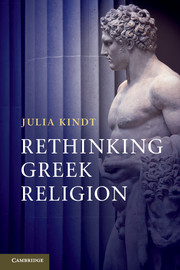Book contents
- Frontmatter
- Contents
- List of Figures
- Acknowledgements
- List of Abbreviations
- Introduction
- Chapter 1 Beyond the polis: rethinking Greek Religion
- Chapter 2 Parmeniscus’ journey: tracing religious visuality in word and wood
- Chapter 3 On tyrant property turned ritual object: political power and sacred symbols in ancient Greece and in social anthropology
- Chapter 4 Rethinking boundaries: the place of magic in the religious culture of ancient Greece
- Chapter 5 The ‘local’ and the ‘universal’ reconsidered: Olympia, dedications and the religious culture of ancient Greece
- Chapter 6 ‘The sex appeal of the inorganic’: seeing, touching and knowing the divine during the Second Sophistic
- Conclusion
- Bibliography
- Index
Introduction
Published online by Cambridge University Press: 05 August 2012
- Frontmatter
- Contents
- List of Figures
- Acknowledgements
- List of Abbreviations
- Introduction
- Chapter 1 Beyond the polis: rethinking Greek Religion
- Chapter 2 Parmeniscus’ journey: tracing religious visuality in word and wood
- Chapter 3 On tyrant property turned ritual object: political power and sacred symbols in ancient Greece and in social anthropology
- Chapter 4 Rethinking boundaries: the place of magic in the religious culture of ancient Greece
- Chapter 5 The ‘local’ and the ‘universal’ reconsidered: Olympia, dedications and the religious culture of ancient Greece
- Chapter 6 ‘The sex appeal of the inorganic’: seeing, touching and knowing the divine during the Second Sophistic
- Conclusion
- Bibliography
- Index
Summary
What is Greek religion? What is religion tout court? Is there such a thing as ‘(Greek) religion’?
Richard BuxtonThe polis anchored, legitimated, and mediated all religious activity…
…polis religion encompassed all religious discourse within it.
Christiane Sourvinou-InwoodEven a cursory glance at one of the many handbooks and monographs published in what is now a popular and dynamic area of study (Greek religion) will reveal much information on the intricate links between religion and society. Who marched in a religious procession (pompē) and why? What can the way in which new cults were introduced to the existing polytheistic pantheon of Athens reveal about her ‘collective religious mentality’ during the fifth century bc? And how are blood sacrifice and the subsequent communal feasting related to the socio-political structures of the Greek city? These are the kinds of questions that reverberate among scholars in the field. Indeed, religious practice, control and power have featured prominently in debates on ancient Greek religion. The main aim of much productive work done in this area is to demonstrate the various ways in which religion maps on to the socio-political structures of Greek society.
There is, of course, nothing wrong with this aim. At the same time, however, there are also a few obvious omissions in the picture of the religious dimension of ancient Greece that emerges from this research. For example, we find very little on religious beliefs and religious discourse. Neither does individual engagement with the supernatural about private concerns (‘personal religion’) feature largely. Moreover, there are various religious phenomena and institutions, such as beliefs and practices labelled ‘magic’ and mystery religions, which are partly or wholly outside the scope of communal and authorised religious practices and which are therefore frequently presented as merely peripheral to our understanding of ancient Greek religion.
- Type
- Chapter
- Information
- Rethinking Greek Religion , pp. 1 - 11Publisher: Cambridge University PressPrint publication year: 2012



